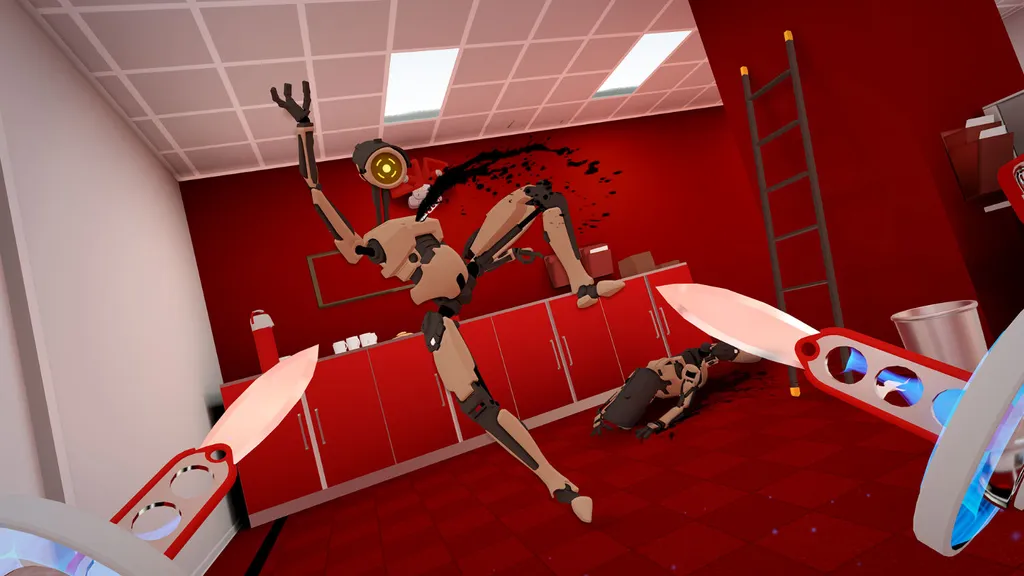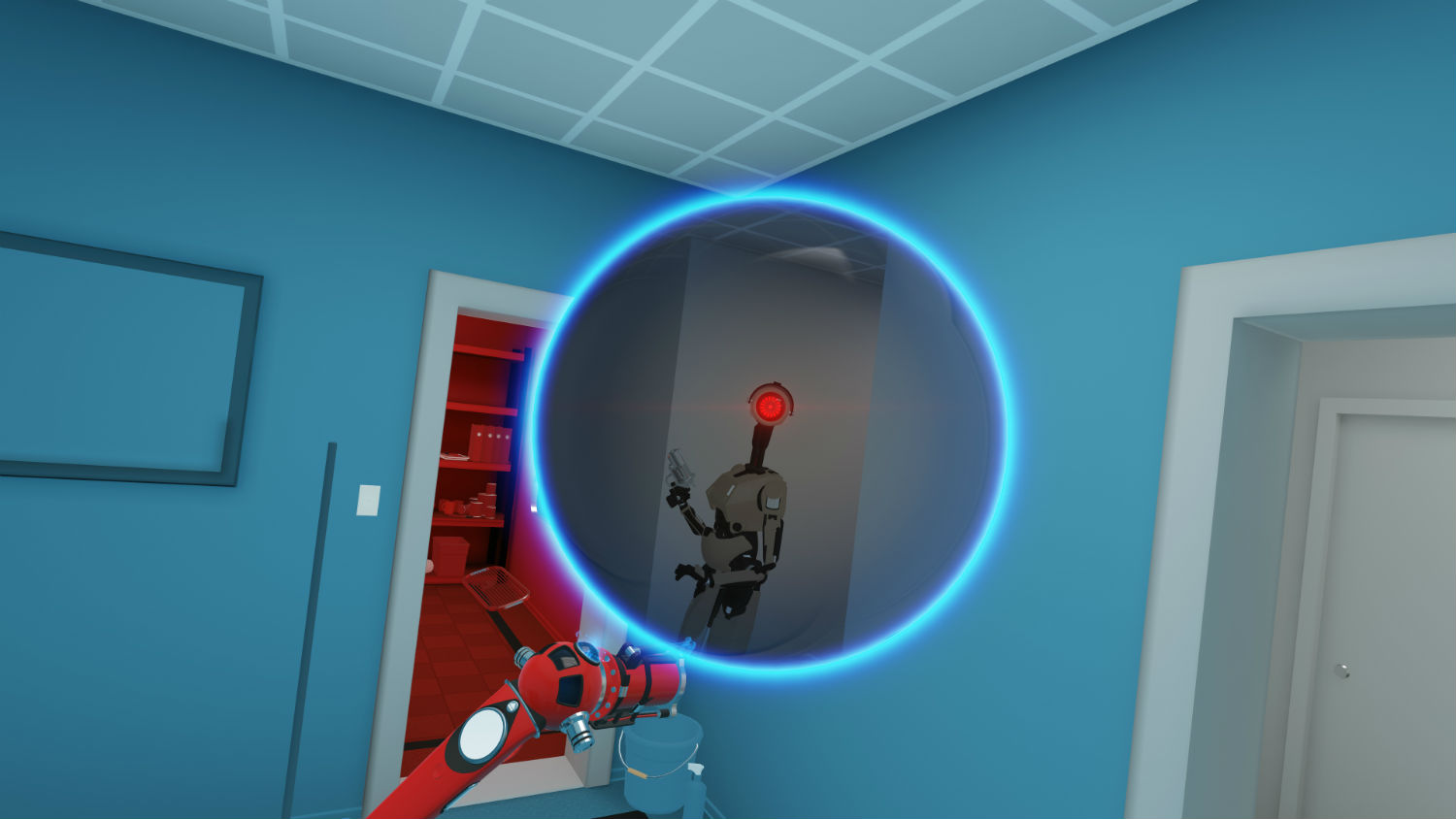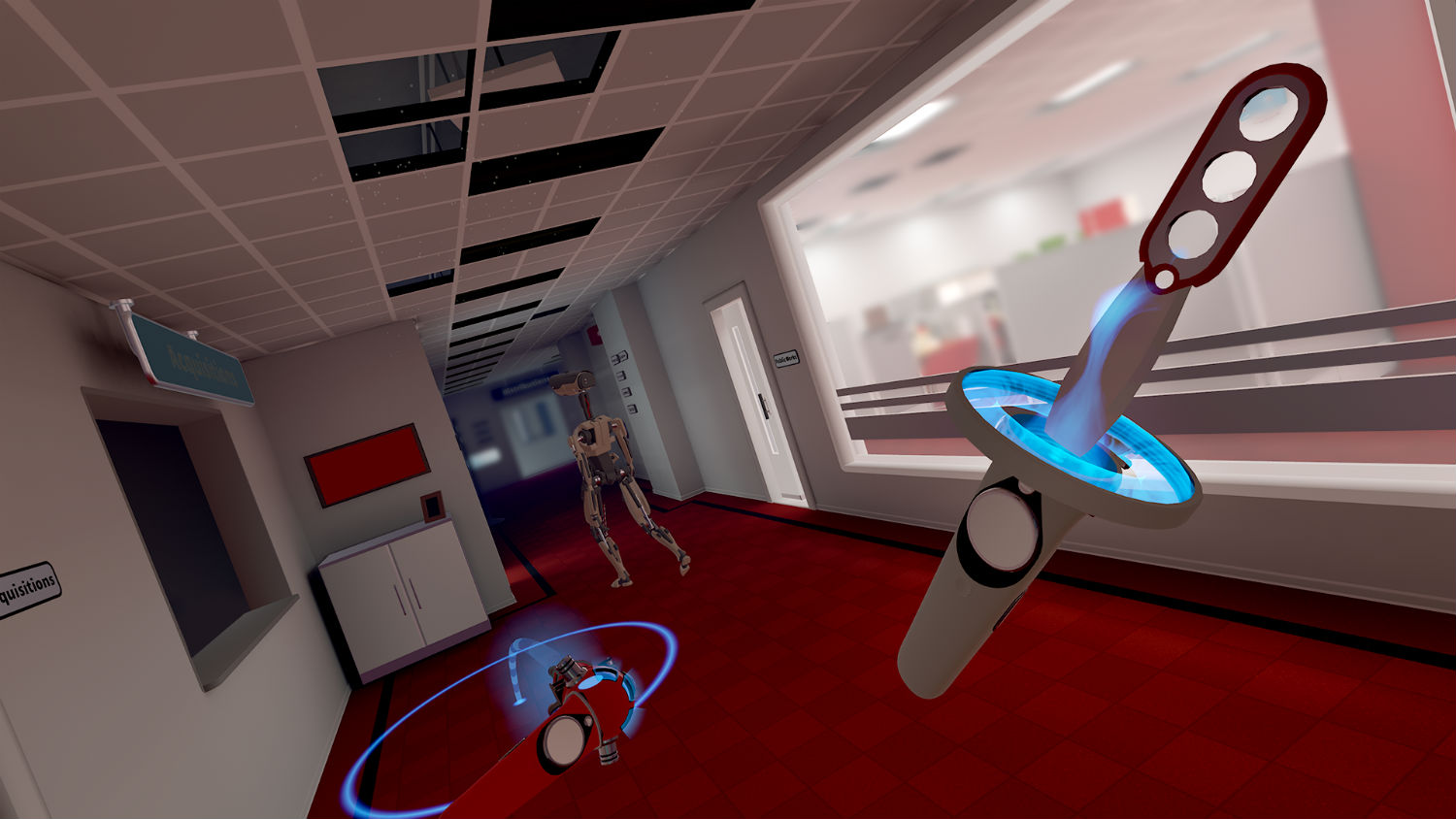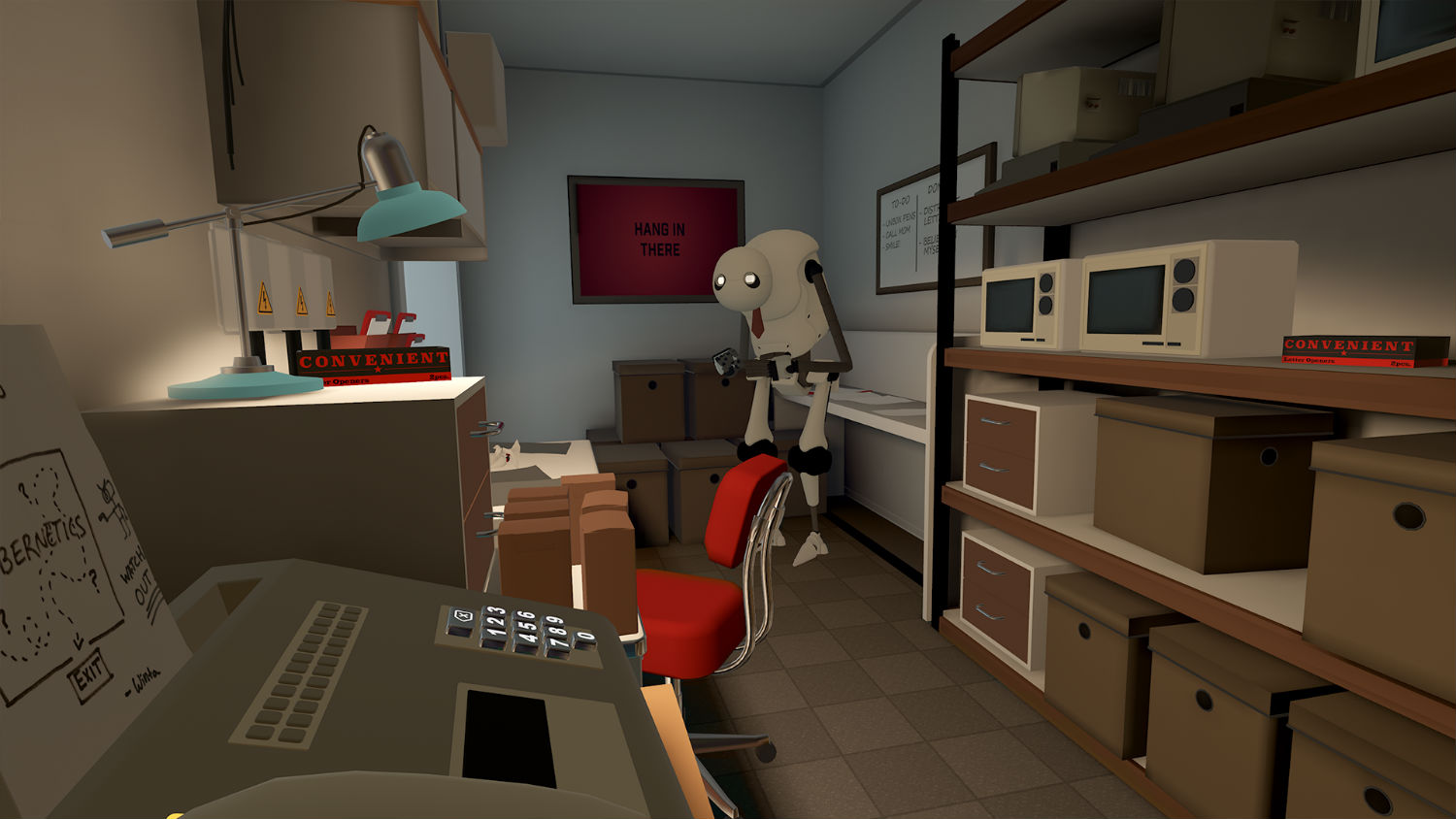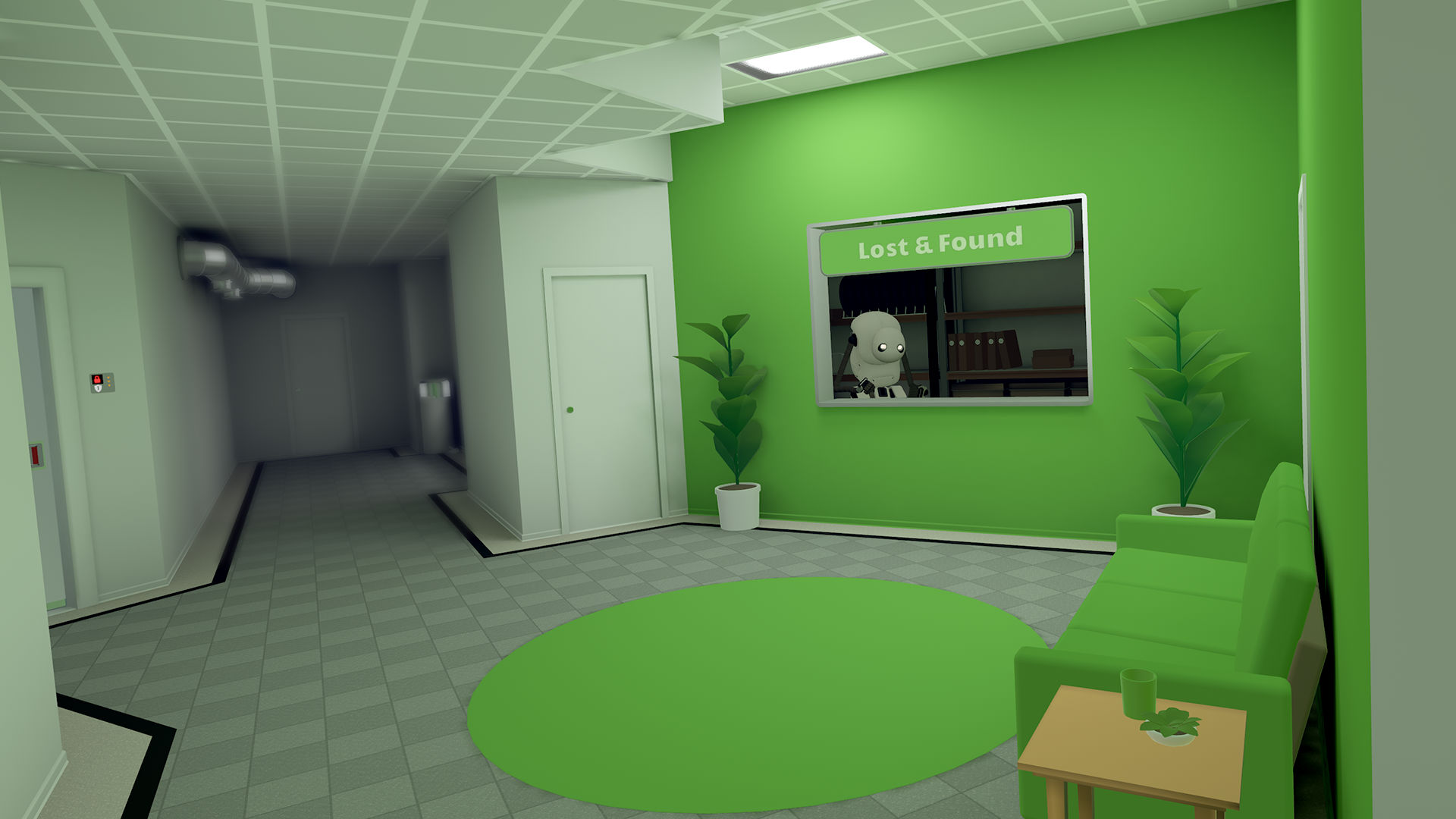The last thing I expected Budget Cuts to do was to make me question my mental stability, but here I am, standing over the crumpled body of a harmless worker-bot with a pair of scissors in its back. I put those scissors there. I found myself next to this well-mannered machine and smiled at his cheery greeting, then I killed him. I watched him wave his arms in unexpected agony and then drop to the floor, lifeless. And I grinned from ear to ear while I did it.
See, Budget Cuts, the long-awaited VR stealth game from Stockholm-based Neat Corporation, is probably the nicest, most polite virtual world you could visit inside a VR headset. It’s a tamer, wannabe Aperture Science; office spaces are lined with visual jokes about every day being Taco Tuesday and its swinging soundtrack bumbles along at a pleasant pace even when you’re on the run from its robotic guards. But it also gives you one thing a lot of other experiences don’t, something that can cancel out all that kind-hearted world-building with a single stab in the back: freedom.
It’s up to you how you make your way through the world of Budget Cuts. You can be as a ghost, albeit one that teleports, keeping to your knees as you dart between indenti-kit office cubicles, daring yourself to peek around corners to see if the coast is clear and scanning for hidden exits. Or, if you’ve got a decent throwing arm, you can take the decidedly more malicious route, locating sharp things to stab into patrolling guards, either picking them off one-by-one or doing your best Neo impression as you take everyone on at once.
These choices are what make Budget Cuts thrive; there’s a spontaneity to the last-minute backstabbing and instinctive ducking that you just couldn’t get with a gamepad in your hand. But the chaos can go both ways, and you’ll often find Budget Cuts crumbles under the weight of this ambition, too.
Take the path of the murderer, for example. If you choose to slay your way through the game you’ll see it at both its best and worst. For the former, it’s the super-slick sensation that comes with popping out from behind a corner, tossing a knife and then vanishing back behind the wall as your enemies slump to the floor. It’s just as brilliant when things go wrong within the rules of the game, though; if you miss you’ll put guards on alert and have to double back and assess your next plan.
Better yet, if you hit something non-vital you’ll see the guard yelp in pain, but give them enough time to return fire before they succumb to their wounds. Budget Cuts constantly demands you formalize and act upon ‘Plan B’ at a moment’s notice, and it keeps you on edge throughout.
On the flip side, the sheer amount of possibilities on offer can leave enemy AI confused. There’s no real ramification for the body of a guard being discovered; the corresponding bot will just have a quick scan of the current room before resuming normal service. In the latest build, though, you can also put this to your advantage, springing traps that will have your enemies spilling over themselves as they race to put a bullet in you. It’s giddy fun, but I also couldn’t help but wish these minions could compose themselves a bit more; they’ll often struggle with sticking to patrol routes and walk off in weird tangents, or spot you through a window then spend five minutes trying to walk through a door they can’t open. They can be a bit of a shambles, to be frank.
The straight stealth option is decidedly cleaner, though comes with added frustrations. It’s the pure brilliance of Budget Cuts’ teleportation system that makes it possible; you fire a gun that launches a ball-shaped locator, then projects a portal showing the surroundings at your next location. You’re free to look around and make sure the coast is clear (though robots can see you through the portal), then click or hold a grip button to either jump straight there or slowly transition over. With patience, good aim and fast reactions, you can zip through any layout without leaving a trace.
Getting spotted can be more infuriating than you’d hope, though, as it’s impossible to give flight while simultaneously dodging bullets, especially since only one needs to hit to kill you on Normal difficulty. As great as the teleportation is, it can’t keep up with these more demanding moments, meaning you’re more than likely to die if you slip up and that often means repeating the last five minutes of gameplay over and over. At one point, having cleared four of five enemies in a room, the last sentry randomly diverged from his normal walking route, spotted me and killed me, wasting 10 minutes of progress. It was one of the most frustrating moments I’ve had in VR.
For all its open-ended brilliance, there are also times the game leaves you in the wind a little too much, hiding secret passages that will take you ages to uncover or just generally being unclear on what you need to do. I spent far longer in Budget Cuts scratching my head, wondering what to do next than I should have.
It takes a bit of luck for Budget Cuts to work like you’d want it to, then, but when it does click it’s quite fantastic and, crucially, worth enduring those frustrations for. It’s a game that understands the human element of stealth in VR; peeking around corners to get a good sense of your surroundings, or hiding behind a pillar, hands sweating as you wait to shove a knife into a robot’s head. There’s also a nerve-shredding game of cat and mouse with a larger enemy that takes the game into more thrilling if sometimes too creepy territory.
Ultimately, though, the game ends up a little too much on the short side (my playtime came to 3 hours and 49 minutes and that’s with long stretches of being lost) and its abrupt ending feels more like a midway point than a proper conclusion. As much as I had enjoyed Budget Cuts’ best parts, I’d felt like I’d spent much of my time stumbling over the rest of the game to get to them.
You may recall that we initially didn’t score the game when we first got our hands on it last month thanks to an overwhelming amount of bugs, many of which were game-breaking. Well, we were fortunate enough not to encounter these issues anymore when we returned to our SteamVR build. That said, bugs still remain Budget Cuts’ greatest issue. In just about every level I could depend on seeing robots continuously walking into walls, have weapons flying out of my hand as I teleported, or see bodies crumple back to the floor as I rounded the corner as if enemies were only pretending to be dead. None of this can ruin the experience, but it’s an often sour reminder that you’re not really the elite sneaking robot you might have thought you were.
As a side note, I have seen players complain about still having game-breaking bugs. I wasn’t able to replicate any of the more common notes, but just be aware that holding off for a few more patches is likely still a wise choice.
At its best, Budget Cuts is a gleeful stealth playground that thrives on the spontaneity it demands of players. At times it will have you holding your breath as you crouch under cubicles and then cackling with laughter as robots run head-first into a pair of scissors. But it’s a game that can also succumb to the weight of its lofty ambitions, constantly wrestling with irritating bugs, imperfect systems and coming up light on content. It took two years for Budget Cuts to come out, but I can’t help wishing we’d all been a little more patient.
Budget Cuts is available now on Oculus Rift and HTC Vive for $29.99.Check out these official review guidelines to find out more about our process.
Editor’s Note: This review is based on the final version of the game as of June 19th, 2018 which is publicly available for purchase. Previously, the article at this URL was a review-in-progress without a score based on a pre-release build, but we’ve updated the review to be finalized with a score based on the final game.

